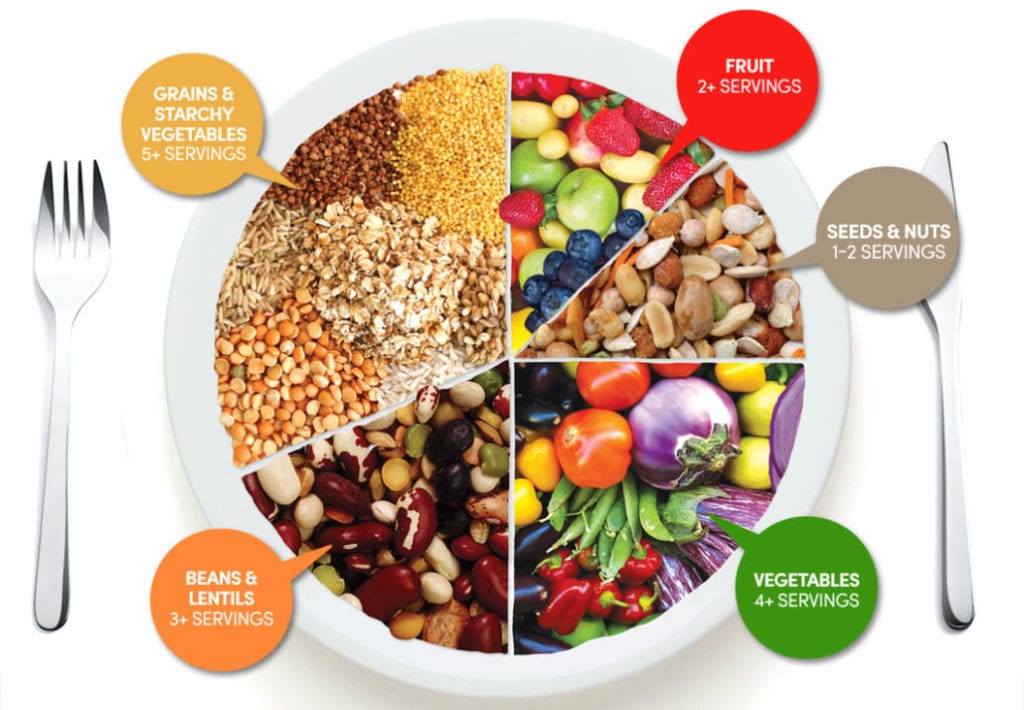Written by Alyssa Ursini, MSN, APRN, FNP-C
Happy National Bacon Day! What better way to [ironically] celebrate than by getting informed about a topic that has been gaining a lot of attention over the past several years: PLANT-BASED DIETS! You may have seen documentaries featured on Netflix like Cowspiracy, What the Health, Forks Over Knives, or the newest release, The Game Changers. These documentaries are just a few of many that educate and encourage transitioning to a whole food plant-based diet. So, sit back, grab some fruits and veggies, and read about all the potential health benefits of a whole food plant-based diet.
Health Benefits of a Whole Food Plant-Based Diet
After performing a quick Google search for benefits of a whole food plant-based diet, articles that tout a plant-based diet appear in the thousands. These articles include research and data that reflect positive changes in the following areas: improving heart health, preventing and managing kidney disease, reducing medical expenses, improving school performance for children, protection against prostate cancer, reduction in heart disease, alleviation of pain from rheumatoid arthritis, lowered risk of death from cancer and heart disease, prevention of Type 2 Diabetes, decreased risk of colorectal and breast cancer, decrease in chronic inflammation, remission of Crohn’s Disease, lowered risk factors for heart failure, healthier weight status, lowered childhood obesity rates, reduction in blood pressure, blood lipids, and weight. According to researchers, most health benefits of transitioning to a whole food plant-based diet can be seen in a short period of time, some in as little as two weeks after initiating this lifestyle change.
The Basics of a Whole Food Plant-Based Diet
Now let’s dive in and look at what this diet includes. A whole food plant-based diet includes natural vegetables, fruits, seeds, nuts, and grains while eliminating animal-based foods (meat, eggs, and dairy) and is free from processed and packaged foods. For all those meat lovers out there that are considering making the dietary switch, slow and steady will win this health race. Making small changes such as picking one day a week to go meat-less and transitioning to nut-based milk instead of dairy milk are all small steps that have been proven to make the transition easier.

Science and Research Around Plant-Based Diets
Next, let’s take a look at the science and hard data behind this dietary lifestyle. A meta-analysis of 40 studies expanding over a 40-year period examined over 12,000 vegans (plant-based diet) and compared their diet to those of over 179,000 omnivores (animal and plant diet), and the results showed a marked difference between these two diets. The studies showed that vegans, compared to omnivores, consumed less energy and less saturated fats, had a lower body mass index, lower cholesterol levels (low-density lipoprotein cholesterol, triglycerides), a lower body mass index, lower waist circumference, lower fasting blood glucose, and lower systolic and diastolic blood pressure. This study, along with many others, shows that a plant-based vegan diet is linked to a more advantageous cardio-metabolic profile when compared with an omnivorous lifestyle.
Benefits Beyond Health
There are several additional benefits of transitioning to a whole food plant-based diet that extends beyond physical and health reasons alone. By consuming plants instead of animal products, a single individual can reduce their carbon footprint by up to 50%, which will help to reduce greenhouse gas emissions, leading to a deceleration in climate change. Additionally, they can save huge amounts of water as approximately 460 gallons of water are required to produce just one quarter-pound hamburger. Marine life destruction can be prevented by eating plants as scientists are estimating that the oceans could be uninhabitable for marine life by the year 2048. Our rainforests, which provide us with the oxygen we need to live, are being cut down to clear land for livestock leading to deforestation and catastrophic changes to the planet.
Continued research is presented daily on the effects of a whole food plant-based diet and we encourage you to do your own research on this topic as we have only barely skimmed the surface in this blog post. If this change is something that sounds beneficial to you, we suggest that you ask your healthcare provider if this diet is appropriate and safe for you!
Reference: Cardiometabolic Health https://www.ncbi.nlm.nih.gov/pubmed/30571724
PLoS One. 2018 Dec 2013(12):e0209086. doi: 10.1371/journal.pone.0209086. eCollection 2018.

Burrito Bowl
Forks Over Knives
Source: www.forksoverknives.com
Ready In: 30 Minutes
Serves 2-4
Ingredients
- Baked tortilla chips
- 2-4 cups cooked grains (Quinoa, Brown rice, Bulgur, Lentils, Spelt, Barley)
- 2-4 cups cooked beans
- 2-4 cups chopped romaine lettuce or steamed kale
- 2-4 chopped tomatoes
- 1-2 chopped green onions
- 1-2 cups corn kernels
- 1 avocado, chopped
- Fresh salsa
- Break a handful of the chips into pieces at the bottom of each serving bowl.
- Spoon some of the cooked grains over the chips, followed by some of the beans, then layer on the rest of the toppings: lettuce or kale, tomatoes, onions, corn, and avocado. Top with the salsa. (Use more or less of all these ingredients, as desired.)
Whole Food Plant-Based Recipes, and More!
https://nutritionstudies.org/plant-based-grocery-shopping-guide/
https://minimalistbaker.com/20-best-plant-based-dinner-recipes/
https://www.pcrm.org/good-nutrition/plant-based-diets/recipes
http://www.dresselstyn.com/site/articles-studies/
https://medium.com/@Kahn642/10-important-plant-diet-vegan-research-studies-of-2018-15841245cdb7


Recent Comments